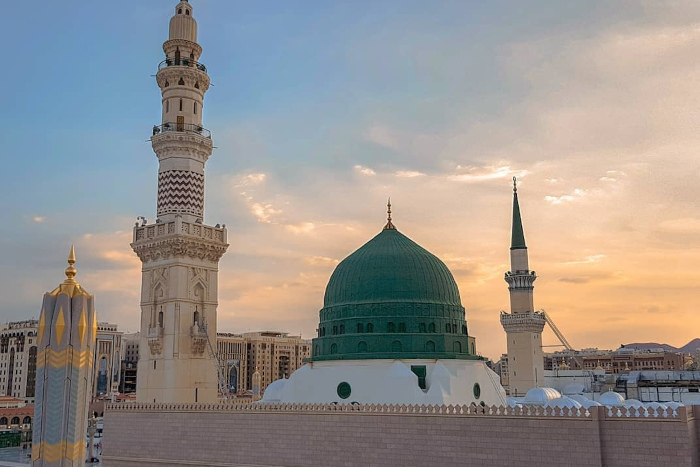
The sunnah of Rasulullah (sallallahu ‘alaihi wasallam) is the only path to reach Allah Ta‘ala, and love for the sunnah is the key to all progress and success. Hazrat Mufti Mahmood Saheb (rahimahullah) had deep love for the sunnah in his heart and this could be witnessed through his strict adherence to the sunnah in all facets of his life.
On one occasion, Hazrat Mufti Mahmood Saheb (rahimahullah) mentioned, “If one wishes to acquire the special attention and blessings of Rasulullah (sallallahu ‘alaihi wasallam) and be with him in Jannah, then the only way to acquire this is for one to bring the sunnah of Rasulullah (sallallahu ‘alaihi wasallam) into his life. One must firmly hold onto the sunnah and make his entire life conform to the sunnah. If any action is against the sunnah, then one must never carry it out – no matter how beneficial it outwardly seems to be. What will a person do with that ‘benefit’ which is the means for Allah Ta‘ala and Rasulullah (sallallahu ‘alaihi wasallam) becoming displeased? Will one be able to take this ‘benefit’ into the grave? It is only one’s righteous actions that will benefit him in the grave. Righteous actions are a means of goodness, and hence one needs to carry out righteous actions. Evil actions are a means of total destruction and ruin, hence one should ensure that one repents from all evil actions and sins before passing away.” (Hayaat-e-Mahmood 2/365)
Below are some examples of how Hazrat Mufti Saheb (rahimahullah) upheld the mubaarak sunnah of Rasulullah (sallallahu ‘alaihi wasallam) in his life:
The Sunnah Method of Performing Wudhu
When making wudhu, Hazrat Mufti Saheb (rahimahullah) would always wash his hands from the finger tips to the elbows, not vice versa (from the elbows to the finger tips). The reason is that the Fuqahaa have written that this is the sunnah method of washing the arms. Similarly, he ensured that when washing his feet, he would wash them from the toes to the heels as the Fuqahaa have written that this is the sunnah method of washing the feet.
When Hazrat Mufti Saheb (rahimahullah) became old and sickly and required assistance to perform wudhu, then too he would instruct the khuddaam (attendants) to wash his hands and feet in this manner. In fact, Hazrat Mufti Saheb (rahimahullah) was so particular regarding this aspect of wudhu that if a new attendant had come and tried to wash his limbs ‘incorrectly’ (i.e. from the elbow to the finger tips, or from the ankles to the toes), then Hazrat (rahimahullah) would immediately pull his limb away. (Hayaat-e-Mahmood 2/47)
The Sunnah of Making Salaam First
It was the mubaarak sunnah of Rasulullah (sallallahu ‘alaihi wasallam) that he would be the first to make salaam to others, and there are many virtues mentioned in the Ahaadeeth for the one who makes salaam first.
Hazrat Mufti Mahmood Saheb (rahimahullah) was particular regarding upholding this sunnah as well, and would always try to be the first to make salaam to others. Hence, his students mention that it was very seldom that someone preceded him in making salaam. (Hayaat-e-Mahmood 2/53)
The Sunnah of Not Wasting Food
It is the teaching of the Mubaarak Hadith that food should not be wasted. Food is an invaluable bounty of Allah Ta‘ala and should be appreciated. The Hadith teaches us that if any morsel falls onto the ground, then one should pick it up, clean it and eat it.
Hazrat Mufti Mahmood Saheb (rahimahullah) was very particular in regard to this sunnah and showed immense appreciation to Allah Ta‘ala for food. Hence, it is mentioned that if any food fell onto the dastarkhaan, Hazrat Mufti Saheb (rahimahullah) would pick it up and eat it. (Hayaat-e-Mahmood 2/229)
The Sunnah of Patched Clothing
Hazrat Mufti Saheb (rahimahullah) disapproved of students wearing clothing that was torn. Once, on seeing a student wearing torn clothing, he reprimanded him saying, “Put a patch on the torn portion. To wear patched clothing is sunnah, and to wear torn clothing is discouraged.” (Hayaat-e-Mahmood 1/309)
 Ihyaaud Deen An Effort to Revive Deen in Totality
Ihyaaud Deen An Effort to Revive Deen in Totality



